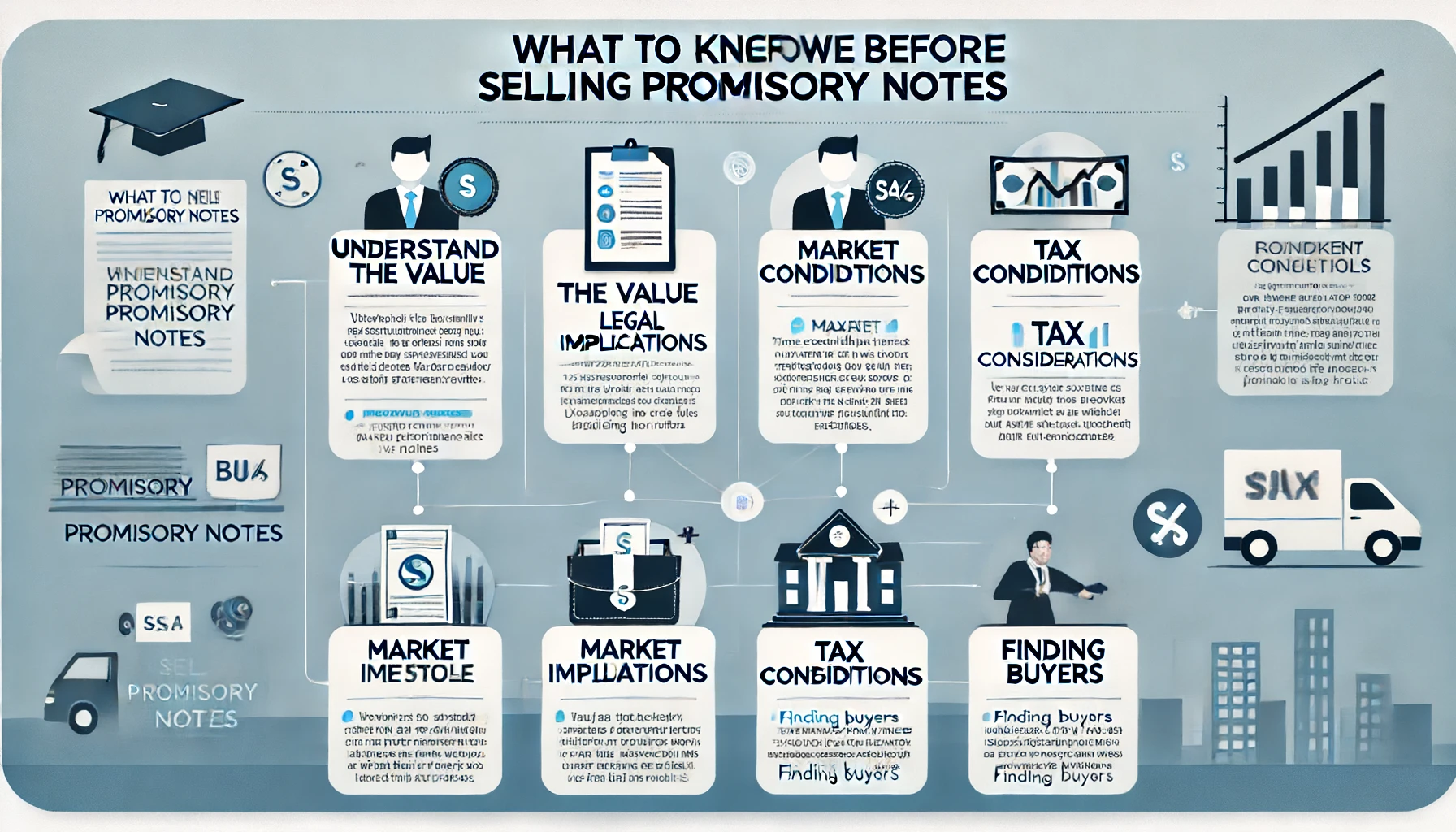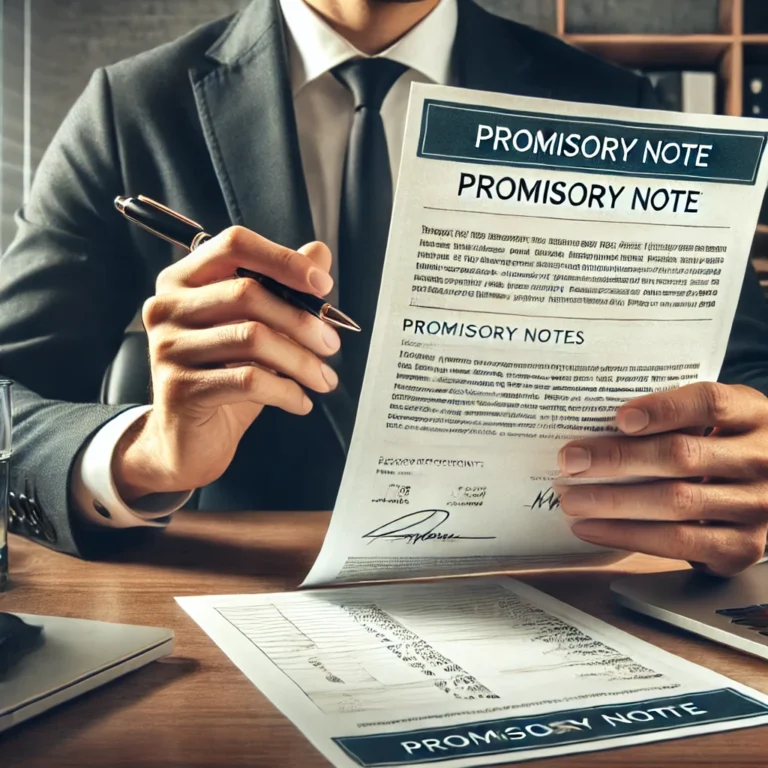What to Know Before Selling Promissory Notes
Selling Promissory Notes
When it comes to real estate investments, selling promissory notes is an option that many investors consider. This can be a lucrative move, but it’s crucial to understand the ins and outs before diving in. In this guide, we’ll explore everything you need to know before selling your promissory notes.
Understanding Promissory Notes
A promissory note is essentially a written promise to pay a specified amount of money at a particular time or on demand. These notes are often used in real estate transactions to secure financing. As the note holder, you have the right to receive payments from the borrower as agreed upon in the terms of the note.
Reasons to Sell Promissory Notes
There are various reasons why an investor might consider selling a promissory note:
- Immediate Cash Flow: Selling a promissory note can provide immediate liquidity, which can be reinvested or used to cover other expenses.
- Risk Management: If you’re concerned about the borrower’s ability to continue making payments, selling the note can transfer that risk to the buyer.
- Simplification: Managing promissory notes requires ongoing administration and monitoring. Selling the note can simplify your investment portfolio.
Evaluating the Value of Your Promissory Note
Before selling a promissory note, it’s essential to understand its value. Several factors influence the note’s worth:
- Creditworthiness of the Borrower: A borrower with a strong credit history and stable income increases the note’s value.
- Interest Rate: Higher interest rates make notes more attractive to buyers.
- Remaining Term: Notes with shorter terms are generally less risky and, therefore, more valuable.
- Payment History: A consistent and timely payment history boosts the note’s marketability.
- Collateral: Secured notes backed by valuable assets are typically worth more.
Finding a Buyer
Once you decide to sell your promissory note, the next step is finding a buyer. Here are some potential buyers:
- Private Investors: Individuals looking for steady income streams often buy promissory notes.
- Investment Companies: These firms specialize in purchasing notes and may offer competitive terms.
- Real Estate Investment Trusts (REITs): Some REITs include promissory notes in their portfolios.
Negotiating the Sale
Negotiating the sale of a promissory note involves several key steps:
- Determine Your Selling Price: Based on the note’s value and market conditions, set a price that meets your financial goals.
- Review Offers: Evaluate offers from potential buyers, considering both the price and the buyer’s reliability.
- Draft a Sales Agreement: Once you accept an offer, work with a legal professional to draft a detailed sales agreement outlining the terms of the sale.
- Transfer Ownership: Complete the necessary paperwork to transfer ownership of the note to the buyer.
When selling promissory notes, understanding the market dynamics and preparing thoroughly can make the process smoother and more profitable. It’s essential to work with experienced professionals who can guide you through evaluating your notes, finding potential buyers, and negotiating the best terms. By doing so, you can maximize the value of your investment and achieve your financial goals.
Tax Implications of Selling Promissory Notes
One critical aspect to consider before selling a promissory note is the tax implications. The sale of a promissory note can trigger capital gains taxes. The tax rate will depend on how long you have held the note and your overall financial situation. It’s advisable to consult with a tax professional to understand the potential tax liabilities and how to manage them effectively.
Legal Considerations
Selling a promissory note involves various legal considerations:
- Due Diligence: Ensure that all the details of the note are accurate and that there are no hidden clauses that could affect the sale.
- Compliance: The sale must comply with all relevant state and federal regulations. This includes ensuring that the transaction does not violate securities laws.
- Documentation: Proper documentation is crucial. This includes the original promissory note, any amendments, and the sales agreement.
Common Pitfalls to Avoid
When selling promissory notes, there are several common pitfalls to avoid:
- Underestimating the Value: Failing to assess the value of your note properly can lead to selling it for less than it’s worth.
- Ignoring Legal and Tax Advice: Skipping professional advice can result in significant financial and legal consequences.
- Not Vetting Buyers: It’s essential to thoroughly vet potential buyers to ensure they have the financial stability to follow through on the purchase.
- Inadequate Documentation: Incomplete or incorrect documentation can complicate the sale and lead to disputes.
Case Study: Successful Note Sale
Let’s look at a real-world example of a triumphant note sale. Jane Doe, a real estate investor, decided to sell a promissory note to free up cash for a new investment. She had a promissory note with a balance of $150,000 secured by a residential property.
Jane evaluated the note’s value, considering the borrower’s excellent credit score, the high interest rate, and the strong payment history. She found a buyer through a reputable investment company. With professional help, Jane negotiated a selling price of $140,000, allowing her to reinvest in a lucrative opportunity. The transaction was smooth, and Jane successfully transferred ownership within a month, with all legal and tax implications appropriately addressed.
Conclusion
Selling a promissory note can be a strategic move for real estate investors seeking liquidity, risk management, or portfolio simplification. By understanding the value of your note, finding the right buyer, and navigating the legal and tax implications, you can maximize the benefits of the sale. Always seek professional advice and conduct thorough due diligence to ensure a successful transaction.
Key Takeaways:
- Assess the value of your promissory note accurately.
- Find a reliable buyer through private investors, investment companies, or REITs.
- Understand the tax and legal implications of selling your note.
- Avoid common pitfalls by seeking professional advice and ensuring proper documentation.
By following these guidelines, you’ll be well-prepared to make an informed decision about selling your promissory notes and optimizing your real estate investment strategy.







